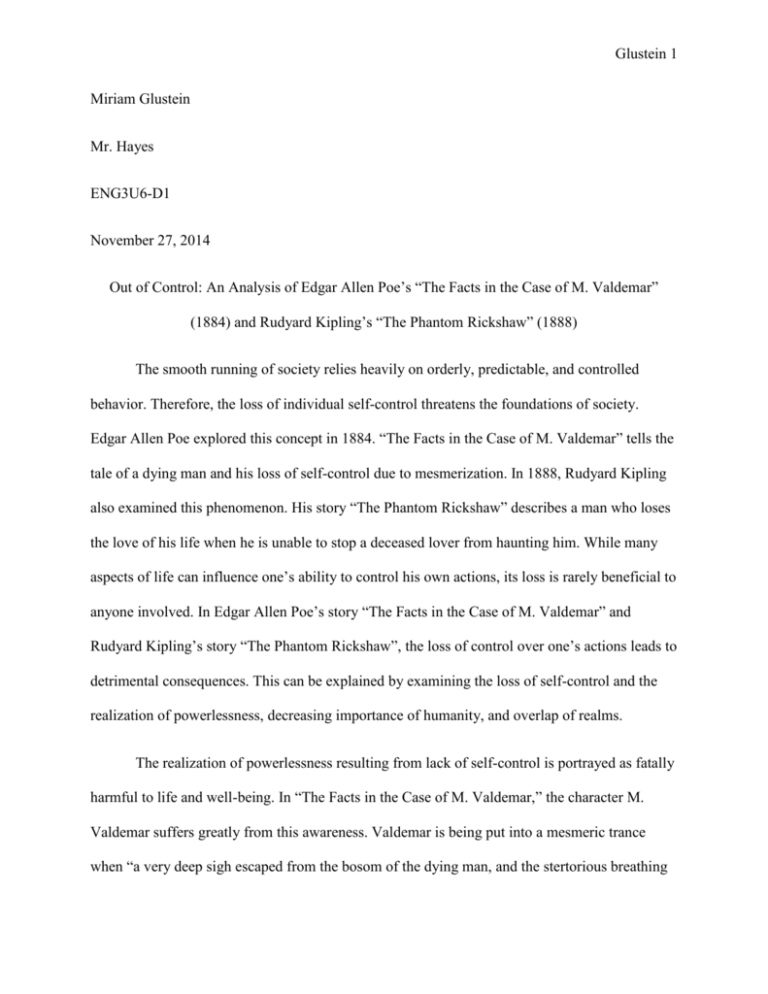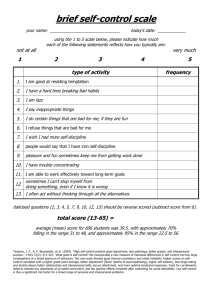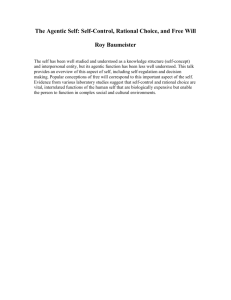The Detrimental Effects Associated with Loss of
advertisement

Glustein 1 Miriam Glustein Mr. Hayes ENG3U6-D1 November 27, 2014 Out of Control: An Analysis of Edgar Allen Poe’s “The Facts in the Case of M. Valdemar” (1884) and Rudyard Kipling’s “The Phantom Rickshaw” (1888) The smooth running of society relies heavily on orderly, predictable, and controlled behavior. Therefore, the loss of individual self-control threatens the foundations of society. Edgar Allen Poe explored this concept in 1884. “The Facts in the Case of M. Valdemar” tells the tale of a dying man and his loss of self-control due to mesmerization. In 1888, Rudyard Kipling also examined this phenomenon. His story “The Phantom Rickshaw” describes a man who loses the love of his life when he is unable to stop a deceased lover from haunting him. While many aspects of life can influence one’s ability to control his own actions, its loss is rarely beneficial to anyone involved. In Edgar Allen Poe’s story “The Facts in the Case of M. Valdemar” and Rudyard Kipling’s story “The Phantom Rickshaw”, the loss of control over one’s actions leads to detrimental consequences. This can be explained by examining the loss of self-control and the realization of powerlessness, decreasing importance of humanity, and overlap of realms. The realization of powerlessness resulting from lack of self-control is portrayed as fatally harmful to life and well-being. In “The Facts in the Case of M. Valdemar,” the character M. Valdemar suffers greatly from this awareness. Valdemar is being put into a mesmeric trance when “a very deep sigh escaped from the bosom of the dying man, and the stertorious breathing Glustein 2 ceased… the patient’s extremities were of an icy coldness” (5). This marks the moment when Valdemar becomes fully mesmerized, thus losing control of his actions and handing this power over to the narrator. Later, Valdemar begins to suffer from his lack of self-control. He realizes he has no power to change his state, but says regardless, “For God’s sake!-quick!-quick!-put me to sleep-or, quick!-waken me!-quick!” (10). Although he states his wishes clearly, the narrator ignores them and tries to recompose him (10). These events show that he can no longer fulfill his desires and is suffering because of this. He is clearly agitated and wants to be released from the mesmeric state, but his anxiousness is disregarded. Once he recognizes that he can no longer control his actions, Valdemar expresses his acceptance and desire for death. Valdemar says “Do not wake me!- let me die so!” (6) when asked three times if he is asleep. Since he has lost selfcontrol, he is unable to fulfill his wish. Valdemar’s realization that he can no longer control his actions leads to suffering through the denial of his desires, and, eventually, death. Thus, this cycle of events shows readers how Valdemar’s loss of self-governance proves to be very harmful for him. In Rudyard Kipling’s “The Phantom Rickshaw,” the protagonist, Jack Pansay, also suffers from the realization that he cannot control his actions. Pansay realizes that he can no longer act in accordance with his desires when he loses his beloved fiancée, Kitty. Although she is his true love, his lack of self-control results in “the cut of her riding-whip across my face from mouth to eye, and a word or two of farewell” (13). This moment is when Pansay finally acknowledges that, despite his best efforts, he cannot restrain himself to save the relationship he most values. After realizing his situation, Pansay accepts that he will be haunted constantly by Ms. Wessington. He says “by day I wandered with Ms. Wessington almost content,” and, recognizing his death, also says that he “knew, moreover, that it was my destiny to die slowly Glustein 3 and a little every day” (17). After this acceptance of his death, he loses interest in the activities of the living. For example, Pansay refuses to send in an application for sick leave, telling Dr. Heatherlegh that he “should await the end quietly at Simla” (17). Jack Pansay endures many of the harms resulting from the ending of the illusion of self-control, including suffering and acceptance of death. Another detrimental consequence of the loss of self-governance is the reduction of humanity. Edgar Allen Poe examines this concept in “The Facts in the Case of M. Valdemar”. As the title character loses his ability to control his actions, he is seen as less human and treated accordingly. His life begins to revolve around superficial scientific aspects rather than his feelings and wishes. For example, M. Valdemar’s feelings are ignored when he becomes mesmerized and loses his self-control. He tells the narrator “let me die so!” (6), a request which is completely ignored. The narrator then describes the physical condition of the patient in detail. He states, “his whole frame was agitated by a very slight shivering; the eyelids unclosed themselves so far as to display a white line of a ball; the lips moved sluggishly” (6). By doing this, the narrator is reducing Valdemar to a scientific case, ignoring his humanity and feelings. Valdemar is viewed as a curious phenomenon, worthy of study, rather than a human being, worthy of compassion. This ultimately causes alienation from society. Valdemar is kept in isolation, almost as a secret from the outside world. He is monitored scientifically and checked frequently for signs of life. Although his pulse still beats, he is not considered alive by other members of society. Valdemar does not participate in societal activities and is presumed ‘as good as dead’ by most people. He is thought of as a scientific phenomenon, not a human being. Valdemar’s loss of humanity and separation from others is harmful to his life and well-being. These consequences are a result of his loss of self-control. Glustein 4 Lack of self-control also leads to a loss of humanity in Kipling’s “The Phantom Rickshaw.” In this story, Jack Pansay’s mental and physical state are of great importance to his loved ones and the citizens of Simla, but little else is deemed worthy of interest. Dr. Heatherlegh asks him, “was it broken through D.T. or epileptic fits?”(14). He needs a method of explaining Pansay’s behavior to the public. The true reason behind his conduct- supernatural forces affecting his mind and emotions- is not scientific enough for his friends and community. They merely want an explanation, rather than having to think about Pansay’s humanity. The people of Simla view Pansay as a rare phenomenon that must be explained rather than a deeply troubled person. No one asks about his feelings besides Heatherlegh. This demonstrates the separation of Pansay from the rest of society. After he completely loses self-control, he is told “all Simla knows about that scene on the Ladies’ Mile” (14). Once he tries to integrate himself back into society he finds that “for the rest of my natural life I should be among but not of my fellows” (15). Pansay has been alienated from his town and community. He has been designated as one who cannot control himself, and is therefore not to be included in civilization. Pansay loses his humanity and connection to society as a result of his inability to control his own actions. A final harm that occurs due to a loss of self-control involves the overlap of realms. Life, death, and the third realm of the supernatural are usually kept separate. However, when a man loses his ability to control his own actions, these worlds often merge. Supernatural forces infringe upon the character’s reality. In “The Facts in the Case of M. Valdemar”, mesmerization brings M. Valdemar into the third realm. He begins to be mesmerized when the narrator “commenced the passes…he was evidently influenced”(4). Later, the narrator gains complete control of Valdemar’s arm, reporting “his arm very readily, although feebly, followed every direction I assigned it with mine”(6). At this point, part of Valdemar is under control of Glustein 5 mesmerization, a supernatural force in the third realm. In addition to participating in the third realm, Valdemar is present in both the world of the living and the dead. While scientifically his heart is beating and his voice is heard, he is not able to participate in any aspects of life, putting his mind in the world of the dead. He even believes he is in that realm, stating “now-now-I am dead” (8). This overlap of worlds eventually leads to his death. His body is in the living world, he is controlled by the third realm, and his mind and thoughts are in the world of the dead. He soon dies after he loses his self-control. As Poe writes, “His whole frame at once…absolutely rotted away beneath my hands”(10). Valdemar’s death is partially caused by his separation between the realms, which results from his inability to control his actions. The three realms also blend together in Kipling’s “The Phantom Rickshaw” after the main character loses self-control. The supernatural force that causes Jack Pansay to become powerless over his actions is the existence of ghosts. He is unable to control his behavior when he sees Mrs. Wessington’s ghost, so his control remains in the third realm. His mind is usually in the world of the dead. Pansay states, “I torture myself nightly with a thousand speculations as to the manner of my death”(17). He also describes his awareness of imminent death (17). However, Pansay’s body is still in the world of the living. He is breathing and wandering around Simla. Although he is haunted by ghosts in the third realm and fears the dead world, Pansay is still present in the living world. His division between these realms ultimately causes him suffering since he cannot properly function in any one universe. Pansay’s quality of life is diminished due to his loss of self-control. The loss of self-control leads to negative effects in both “The Facts in the Case of M. Valdemar” by Edgar Allen Poe and “The Phantom Rickshaw” by Rudyard Kipling. Today’s society gives little importance to supernatural powers. However, there are still many other Glustein 6 situations where people lose self-control, such as mental health issues. While sometimes these illnesses are minor, other kinds can severely harm a person’s ability to fulfill their desires, express their feelings, and separate reality from other realms. These emotional disorders often have devastating consequences for those with mental illnesses and their friends and families. This issue currently affects hundreds of millions of people worldwide. In a sense, mental illnesses are the modern version of supernatural forces since they can remove the ability of a person to control his or her actions and little can be done to prevent them. They may also cause acceptance or even desire for death. However, for the time being, mental health destroys millions of lives. With this loss of self-governance, behavior is not orderly and predictable. Thus the efforts of governments to help the mentally ill are merited since loss of self-control threatens the foundations of society and its ability to function effectively, as depicted over a century ago in Poe and Kipling’s stories.






